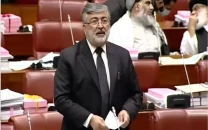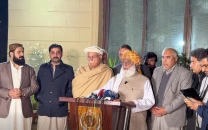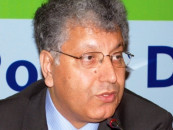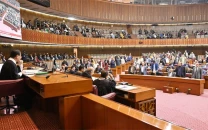Political tug of war: power play continues in Punjab
Analysts call PML-N-PPP alliance a 'marriage of convenience'
1732012115-0/Untitled-design-(14)1732012115-0-640x480.webp)
For much of 2024, Punjab's political landscape has been marked by turbulence. Over the past ten months, the province witnessed the historic appointment of its first female chief minister, Maryam Nawaz.
Yet her term began amid uproar, with the opposition accusing her party, the Pakistan Muslim League-Nawaz (PML-N), of stealing their electoral mandate. The Pakistan Tehreek-e-Insaf (PTI), the main opposition party, led a chorus of allegations, claiming the election results were manipulated to favor the PML-N.
Adding to the complexities, Nawaz has faced significant challenges in managing her coalition government. The Pakistan Peoples Party (PPP), a key ally in the power-sharing arrangement, has proven difficult to placate. Political analysts have described their alliance a 'marriage of convenience,' forged to keep PTI at bay in the most populous province.
However, the union has struggled to find common ground, particularly on power-sharing agreements, leaving their partnership under persistent strain. Despite multiple rounds of negotiations, the PPP and the PML-N failed to reach a lasting agreement on how to divide authority. The legislature remained fractured, reflecting the broader political discord in the province.
On the other hand, tensions between the opposition and the government played out vividly in the Punjab Assembly throughout the year. The budget session for the fiscal year became a flashpoint. Initially opposed by the PPP, the PML-N managed to persuade its coalition partner to lend their support. However, the proceedings were far from smooth. Heated exchanges between government and opposition members led to the suspension of 19 assembly members by the Speakera decision that was quickly reversed.
Inside the assembly, the PTI and PML-N remained at loggerheads, particularly over the allocation of reserved seats. The ruling alliance, led by the PML-N, divided the 27 reserved seats among its coalition partners, with the lion's share going to the PML-N, followed by the PPP, Istehkam-e-Pakistan Party (IPP), and Q-League. PTI strongly opposed this distribution, securing an injunction from the court. In a surprising twist, the Supreme Court ruled in PTI's favor, awarding them the reserved seats. However, this judicial victory did little to alter the legislative and power dynamics.
As far as the attendance sheet is concerned, the eighteenth provincial assembly of Punjab saw 19 meetings in its first parliamentary year. For the first time in history, eight of these sessions were convened at the opposition's requisition, with the remaining 11 called by the government. Over the course of 87 days, the assembly held 63 sessions, during which 13 draft laws were introduced, 12 of which were passed, addressing various public interest issues.
Marriage of convenience
The year 2024 has been a rollercoaster for Pakistan's political landscape, particularly for the Pakistan Muslim League-Nawaz and its principal ally, the Pakistan Peoples Party – both locked in what analysts describe as a 'marriage of political convenience'.
Ahmed Bilal Mehboob, head of the non-partisan think tank PILDAT, believes both Maryam Nawaz and Bilawal Bhutto Zardari are strong contenders for the prime ministership.
"They remain united because their common opponent is the PTI," said Mehboob. He added that their shared threat from the PTI and pressure from the establishment compel the two parties to work together, avoiding open confrontation.
This uneasy partnership, he predicted, will continue until the political conditions become favourable for either party.
However, as the next general election approaches, the unity is expected to wane. "These two parties will likely maintain their alliance for another year or two, but as the five-year term nears its end, they will turn on each other," he added.
Performance, Mehboob pointed out, would be pivotal to Maryam Nawaz's political trajectory. "If Nawaz completes her five-year term successfully, her governance will be her greatest strength in the next elections. The more relief they (PML-N) provide, the stronger their position will be," he concluded.






















COMMENTS (1)
Comments are moderated and generally will be posted if they are on-topic and not abusive.
For more information, please see our Comments FAQ